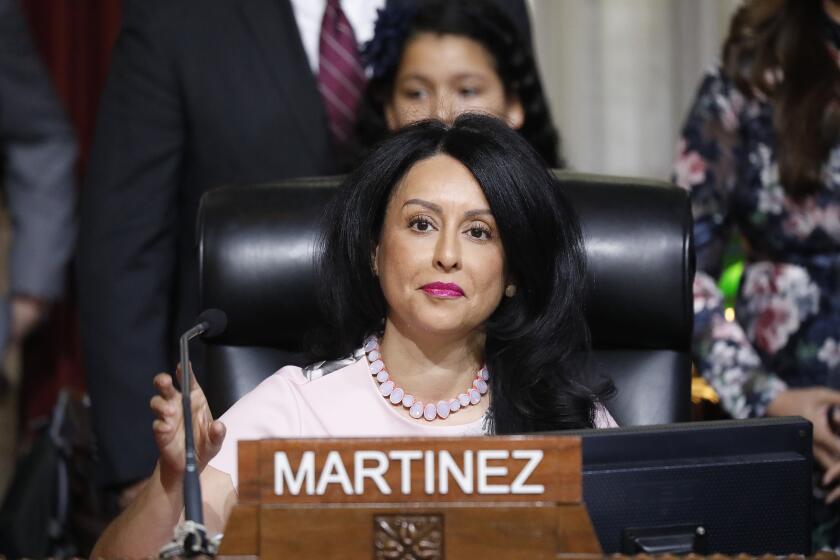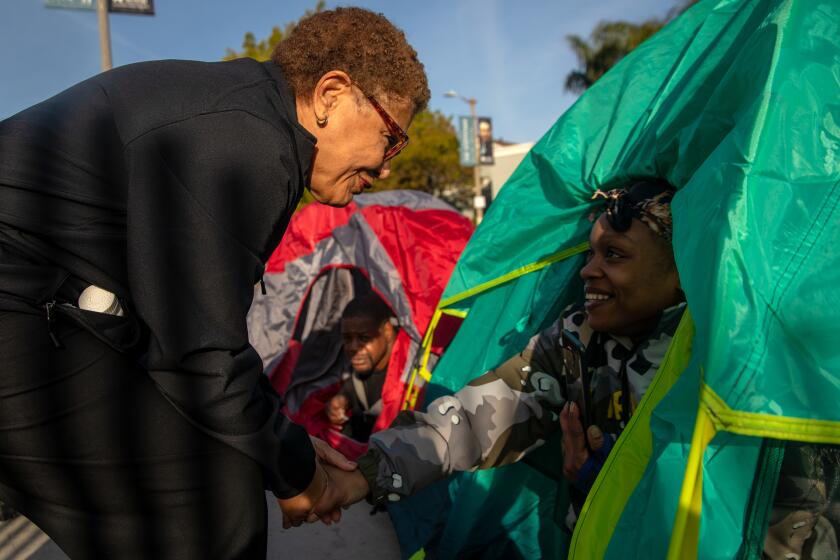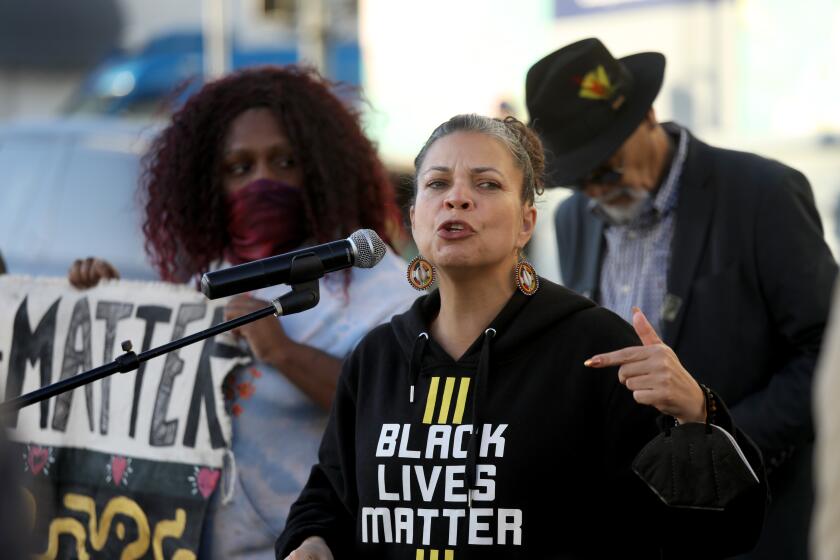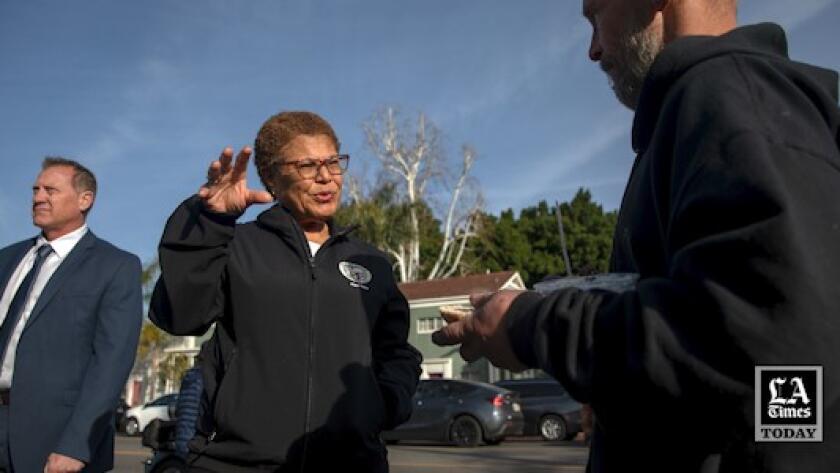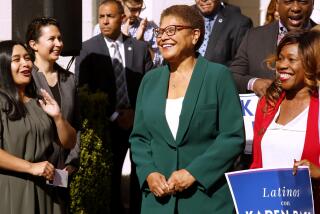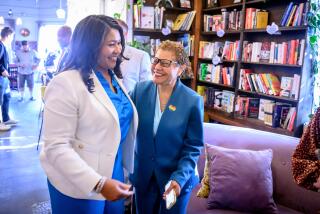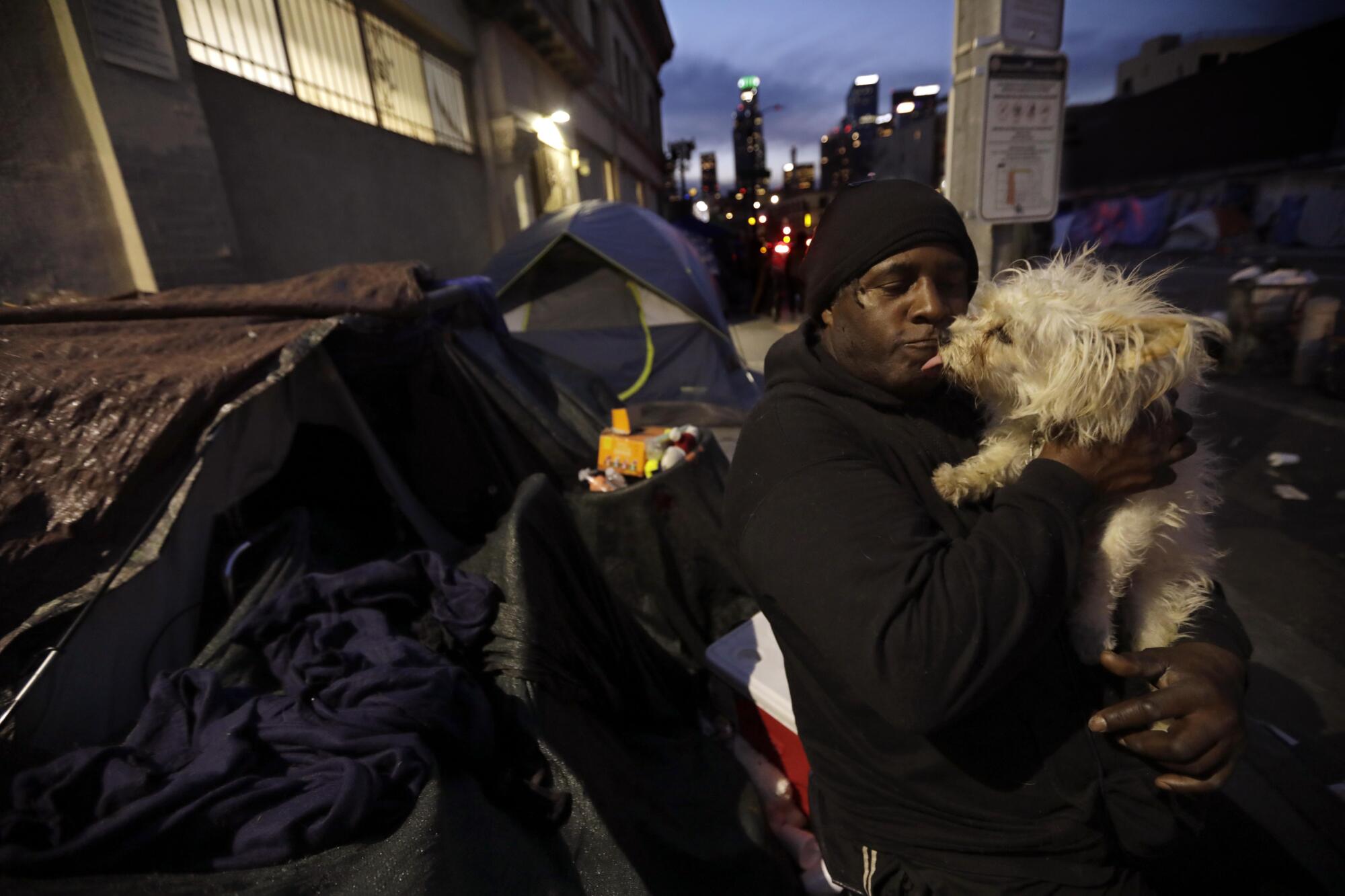
On the eve of her 100th day in office, Mayor Karen Bass enjoys strong approval ratings among Angelenos — a reservoir of goodwill that will be crucial for the new mayor during uphill battles ahead.
Half of Angelenos approve of the job Bass is doing so far, while just 14% say they disapprove, according to a Suffolk University/Los Angeles Times poll conducted March 9-12. A little more than a third remain undecided.
Bass took office as the first woman and second Black Angeleno to lead Los Angeles in mid-December — weeks after defeating businessman Rick Caruso and just two months after a leaked audio tape revealing racist remarks by council members upended City Hall.
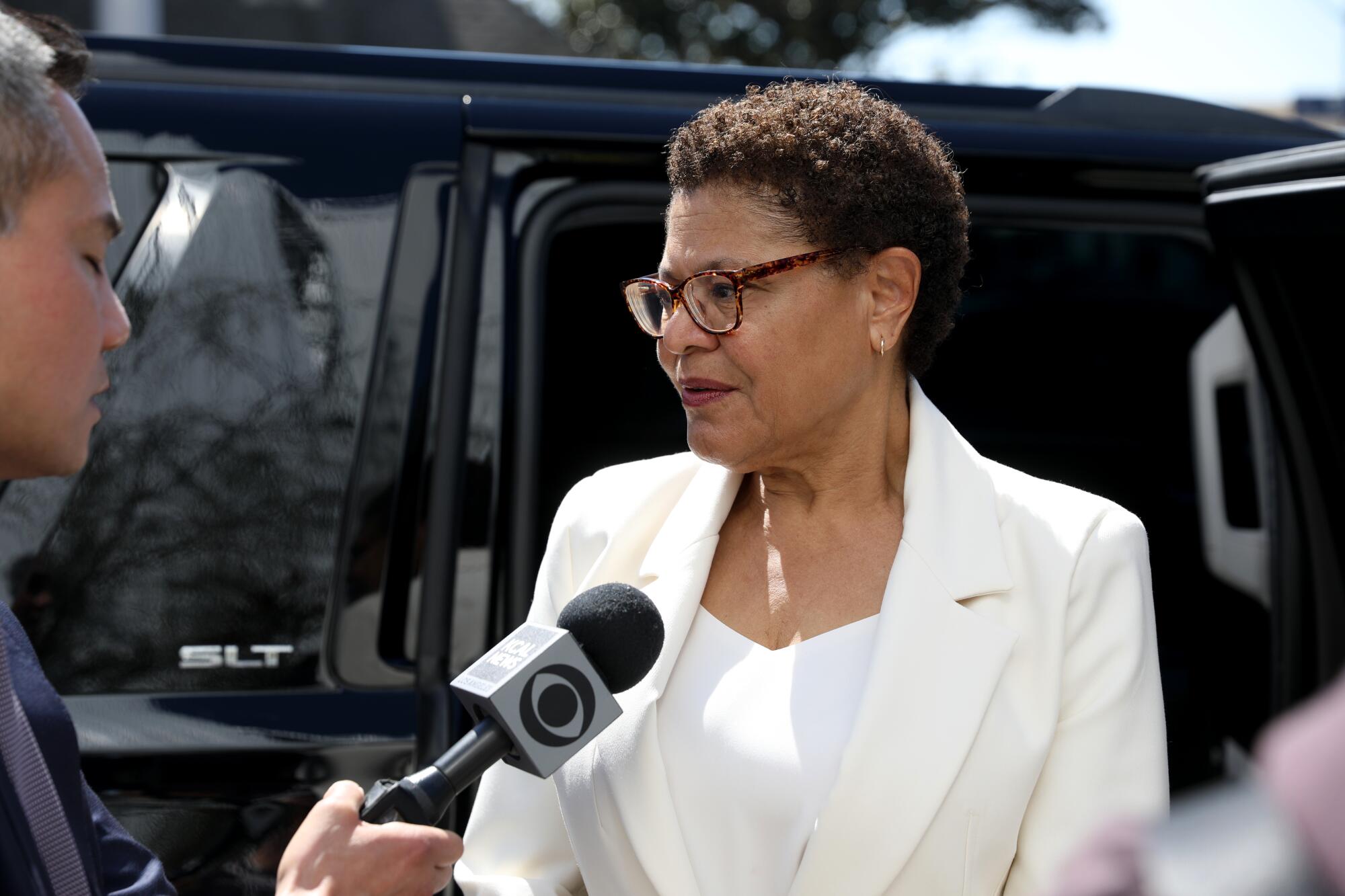
With tens of thousands of people sleeping on the streets every night and her predecessor’s legacy tarnished by his failure to stem the humanitarian crisis, Bass is keenly aware that her success as mayor will be inextricably entwined with progress on homelessness.
Her administration has been focused on the issue since assuming office, at times to the exclusion of other areas. She has been far slower than her predecessors to fill high-profile roles in her office and name city commissioners.
City residents, however, don’t yet see much visible progress on homelessness and are only guardedly optimistic about the future.
A leaked recording of L.A. City Council members and a labor official includes racist remarks. Council President Nury Martinez apologizes; Councilmember Kevin de León expresses regret.
A little more than half of respondents to the poll didn’t think the state of emergency on homelessness, which Bass declared on her first day in office, had yet had any impact on the crisis; just under 3 in 10 said it had improved the situation.
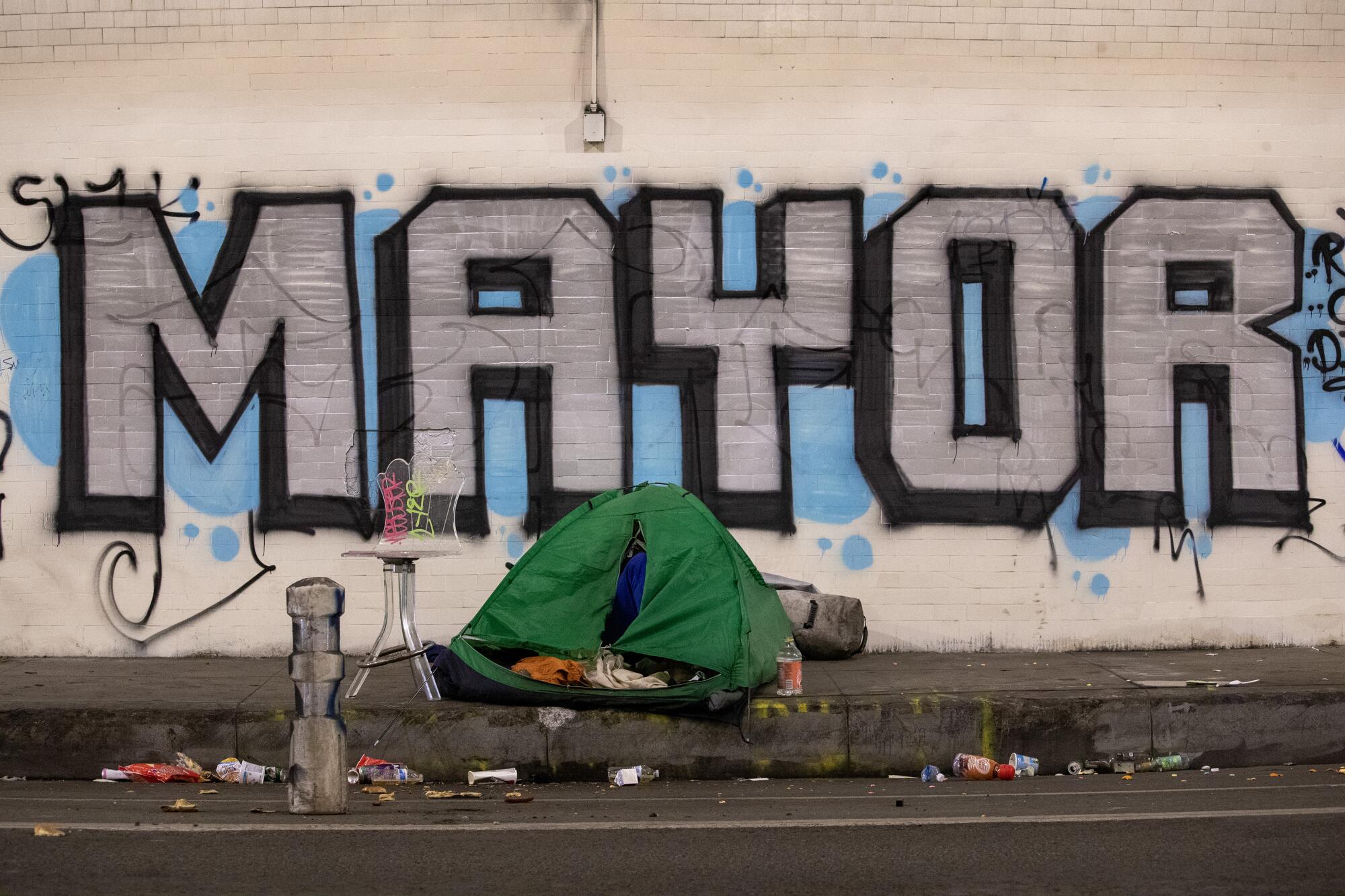
Bass, who reaches her 100th day in office Tuesday, vanquished Caruso, her Republican-turned-Democrat opponent, by consolidating Democratic support in an overwhelmingly Democratic city, and she’s held tight to that support since taking office.
Two-thirds of Democrats said they approved of her work thus far, with the rest largely undecided.
The numbers were far more negative among the city’s Republican minority, with just 15% saying they approved of her job performance, while 58% disapproved.
The fact that the ratio between Bass’ approval and disapproval runs nearly 4 to 1 in her favor puts the mayor in a politically advantageous position as she pursues difficult goals, said David Paleologos, the director of the Political Research Center at Suffolk University in Boston, who oversaw the poll.
“Even on a good day, disapproval for most politicians is in the 20s or 30s,” Paleologos said, compared with 14% for Bass thus far. “So she has a slate that she can kind of begin to etch her priorities on.”
On the top priority, homelessness, Angelenos have limited expectations. Just 17% think the city will make “a lot of progress” on reducing homelessness over the next four years, while 45% say “a little progress” would be more likely. Republicans were far more pessimistic than Democrats.
“It’s the kind of problem where it is going to take time in order to see a real difference. And 100 days is really not very much time at all,” said Councilmember Nithya Raman, a former urban planner and chair of the council’s homelessness and housing committee.
Raman lauded the new focus and urgency that Bass has brought, saying, “I’ve had more conversations with her and her team on the issue of homelessness, including specifics on how we address issues in my district and citywide policy issues, than I did with the previous mayor during the two years that we overlapped.”
Bass said Wednesday that she expects the city will have housed more than 4,000 homeless Angelenos by her 100th day in office.
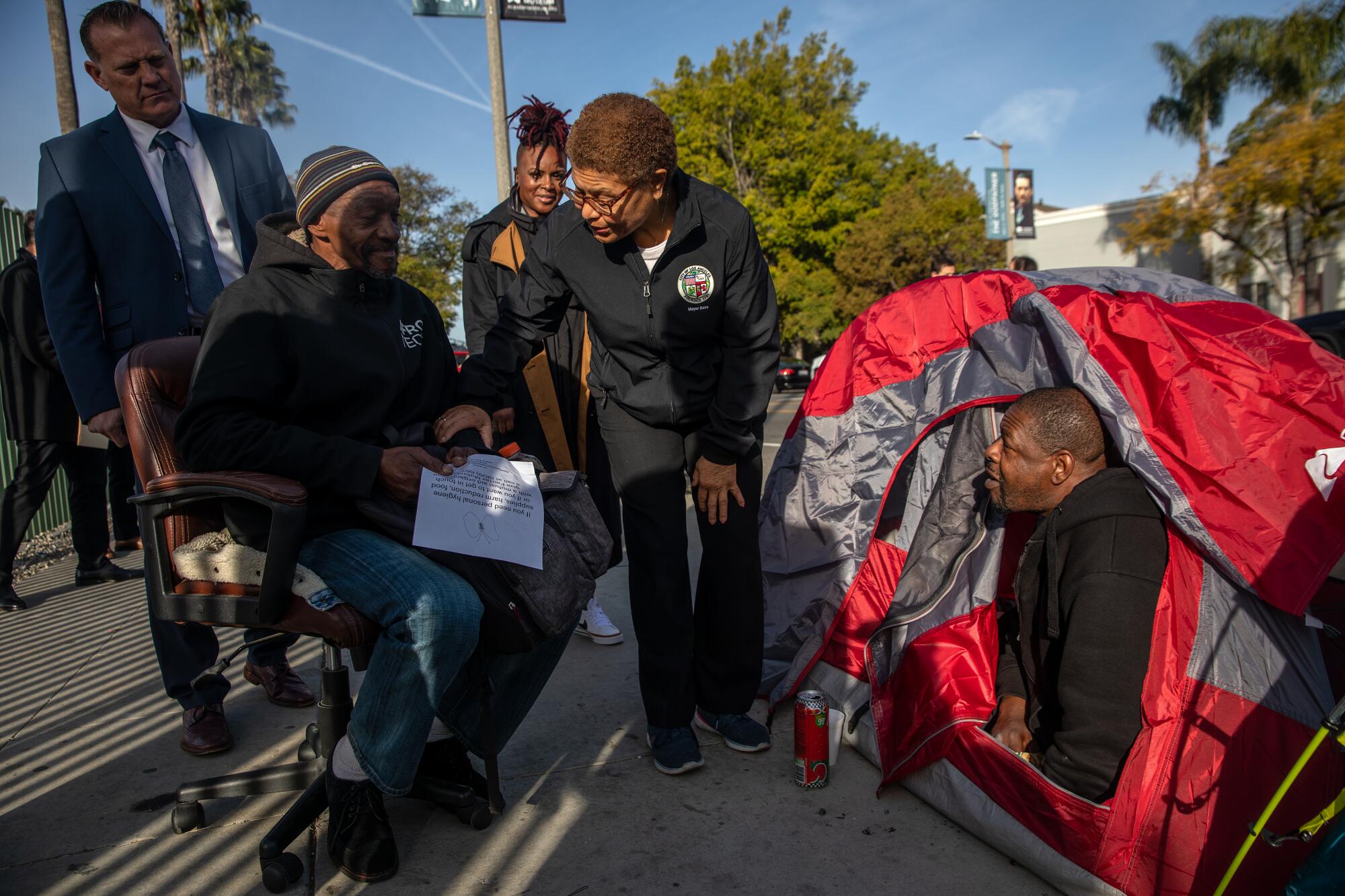
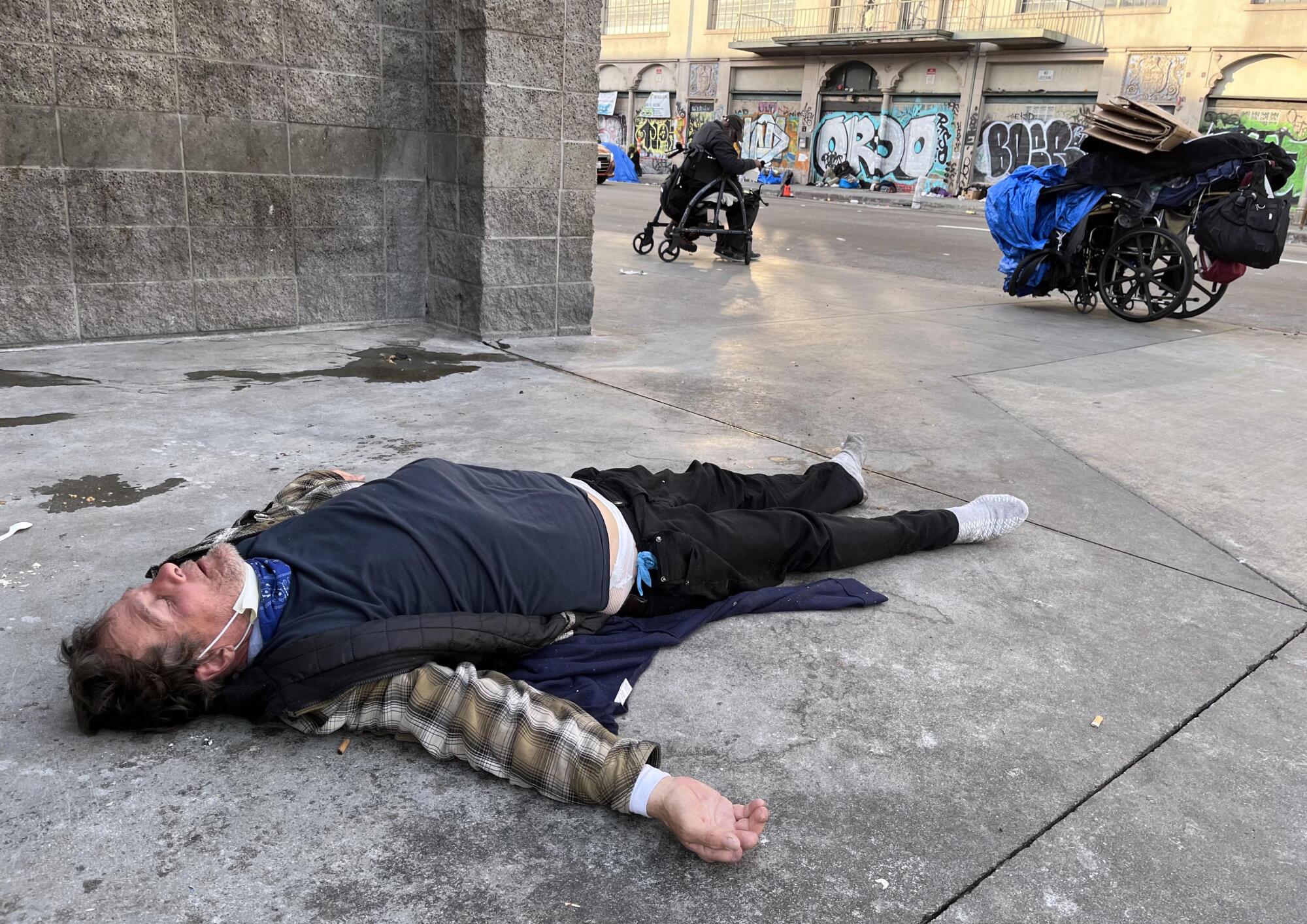
Views about whether Los Angeles can make progress on homelessness are a significant factor shaping whether people view the city as a good place to live, the poll found.
L.A.’s mayor said she expects about one-fourth of those people will come from her Inside Safe program, which has gone to 13 locations so far.
Overall, about half described L.A. as an excellent or good place to live, and the other half marked it fair or poor.
But the crucible of experience produces vastly different versions of the city, and that rough split diverged sharply along lines of race and class.
Higher-income Angelenos were significantly more likely than low-income residents to say L.A. is a good or excellent place to live. More than 6 in 10 white residents gave the city’s livability high marks, compared to just over 4 in 10 Asian and Black residents, and just under 4 in 10 Latino residents.
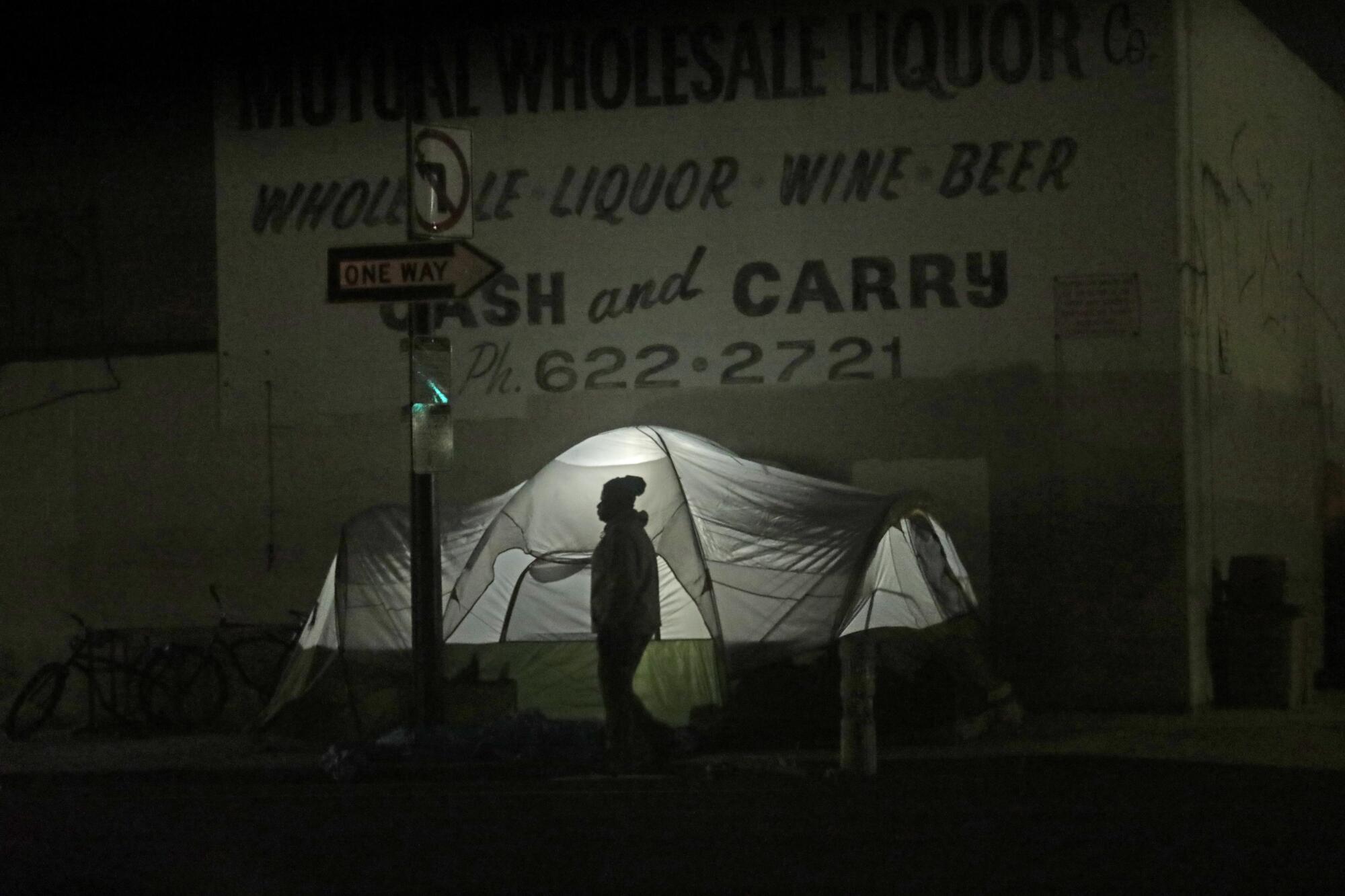
Black residents had a more positive view of what Bass has done on homelessness than did other Angelenos. More than 4 in 10 said the emergency declaration had already improved the situation.
Black Angelenos were also far more likely to say that they or someone they knew had personally experienced homelessness or housing insecurity within the last year — roughly half said so, compared to about 3 in 10 Angelenos overall.
Bass’ approval rating also differed along racial lines. White and Black residents gave Bass slightly higher marks than Latino residents, though all three groups hovered near the 50% average. The poll suggested Bass’ support may be weaker among Asian residents, but the small size of the sample doesn’t allow a definite answer.
Perceptions of crime have a strong correlation with Bass’ approval rating, with Angelenos who say they feel safe in their neighborhoods, 78%, generally approving of Bass, while the minority who feel unsafe give her far lower approval.
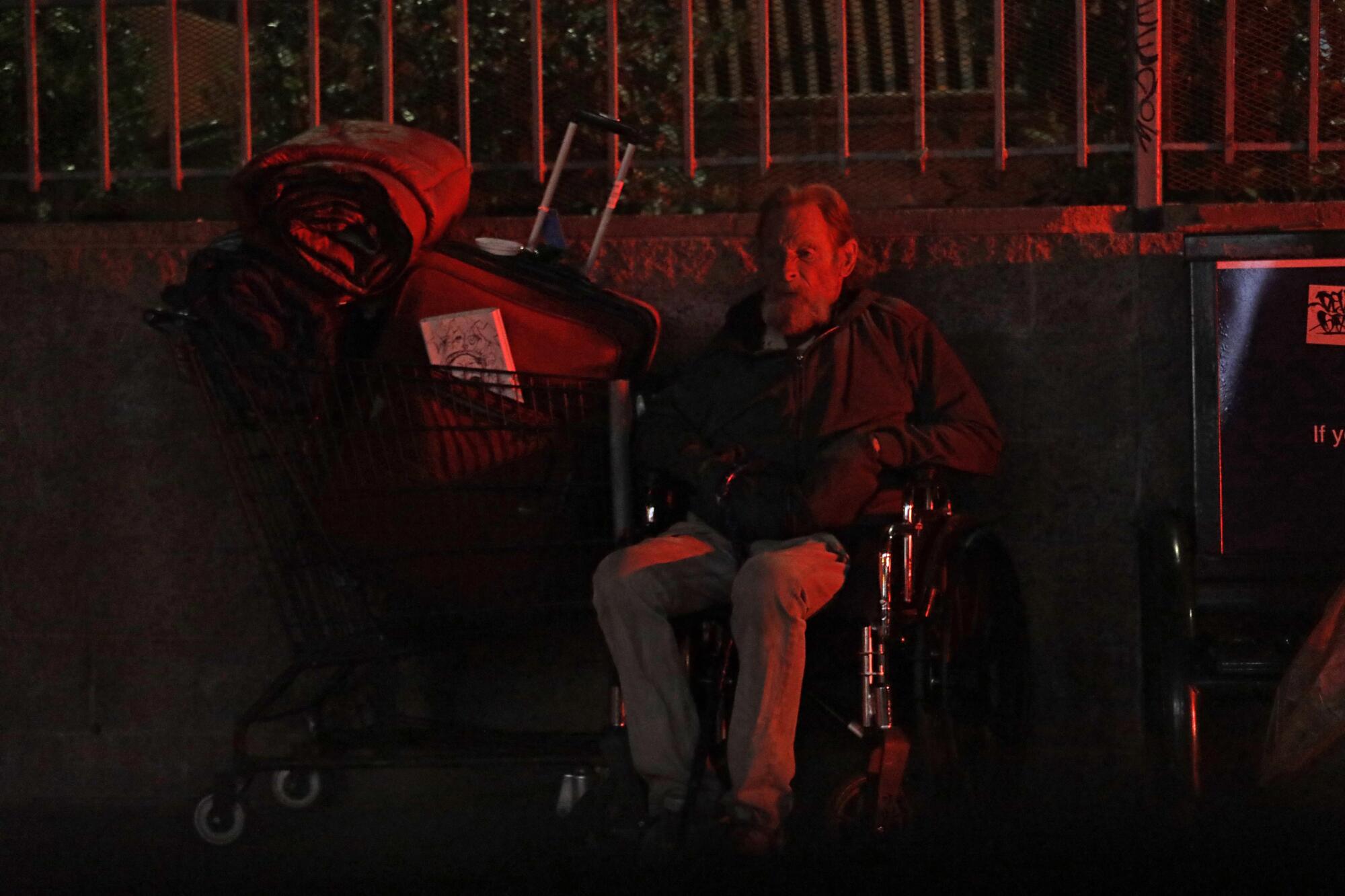
That gap, however, is only partially about people’s experience with crime. Perceptions of crime have become highly politicized, both in the city and nationwide, with dramatic partisan gaps: Three-quarters of Republicans in L.A. say crime is up, while just 37% of Democrats agree. (LAPD statistics show that violent crime and property crime have decreased this year, compared to the same period of time last year.)
The poll does not show evidence that the mayor has suffered any major loss of support on her left. Her decision to support a second term for Los Angeles Police Chief Michel Moore spurred sharp outcry from local Black Lives Matter leaders and others in the city’s leftmost flank, but it was met with something of a shrug from the public.
Leaders of the group described Mayor Karen Bass’ support of the move as a betrayal.
A plurality of Angelenos, 42%, did not have an opinion on the decision, while 38% thought it was a good decision and 18% disapproved. Respondents who think the LAPD is doing an excellent or good job were more likely to approve of the decision to keep Moore than those who rated the department’s performance as fair or poor.
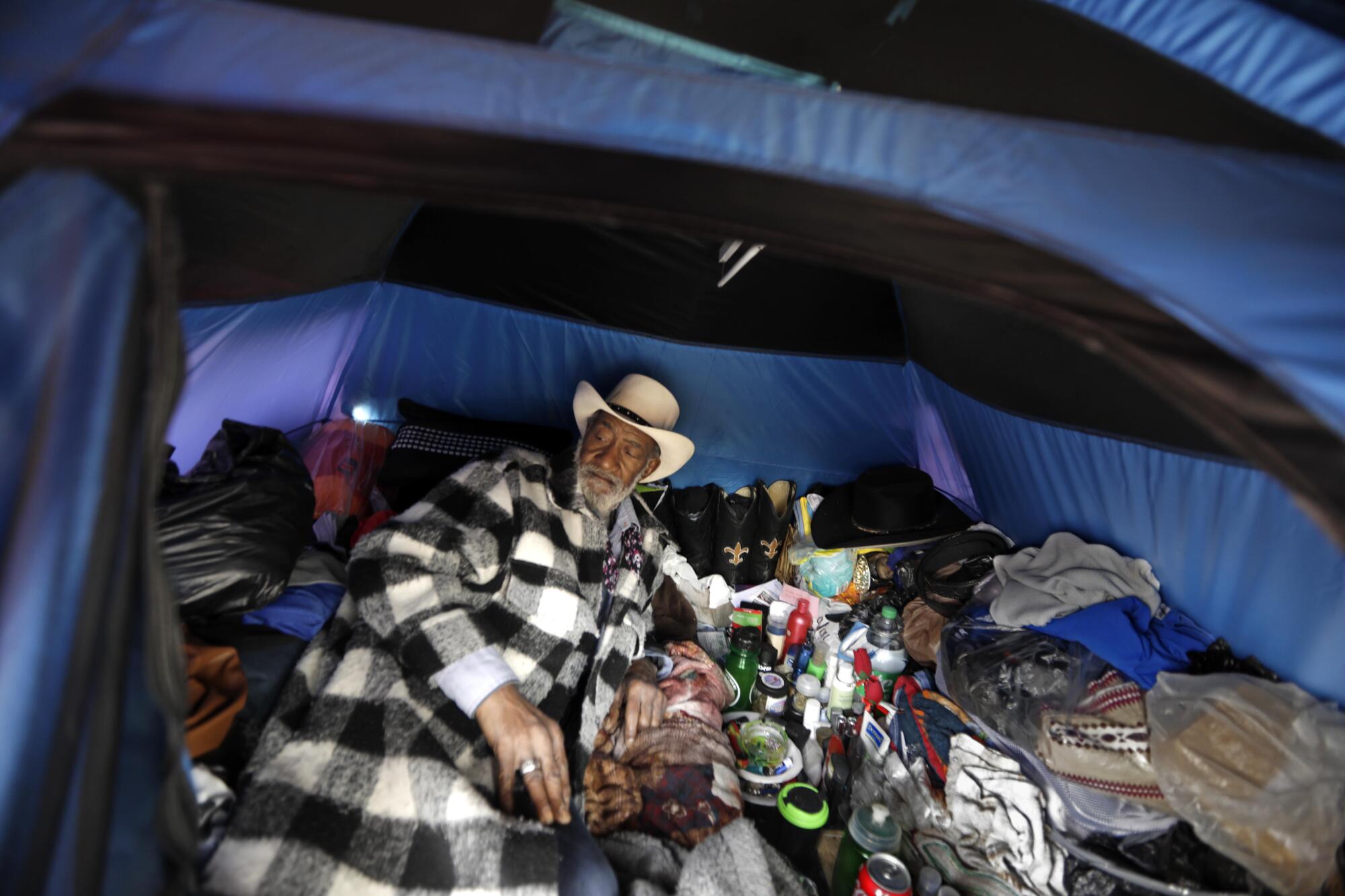
The maneuvering around the Moore decision was illustrative of the new mayor’s pragmatic style.
Firing Moore would have required Bass to expend political capital at a time when she remains near-singularly focused on homelessness and had yet to appoint any of her own police commissioners, to say nothing of the time and resources that a high-profile chief search would have required.
Allowing Moore to stay on — with the understanding that it would be for less than a full four-year term, and with some demands — made for a middle-ground decision that didn’t pull the new administration’s attention too far from its immediate priorities.
No one in the City Council’s progressive bloc publicly criticized the decision, even self-described police abolitionist Hugo Soto-Martínez and Eunisses Hernandez.
The lack of council backlash surprised many political observers. It could speak to Bass’ strong relationships or simply the benefits of a honeymoon period. But it’s hard to imagine that either council member would have stayed mum had former Mayor Eric Garcetti — who preceded Bass — made the same decision.
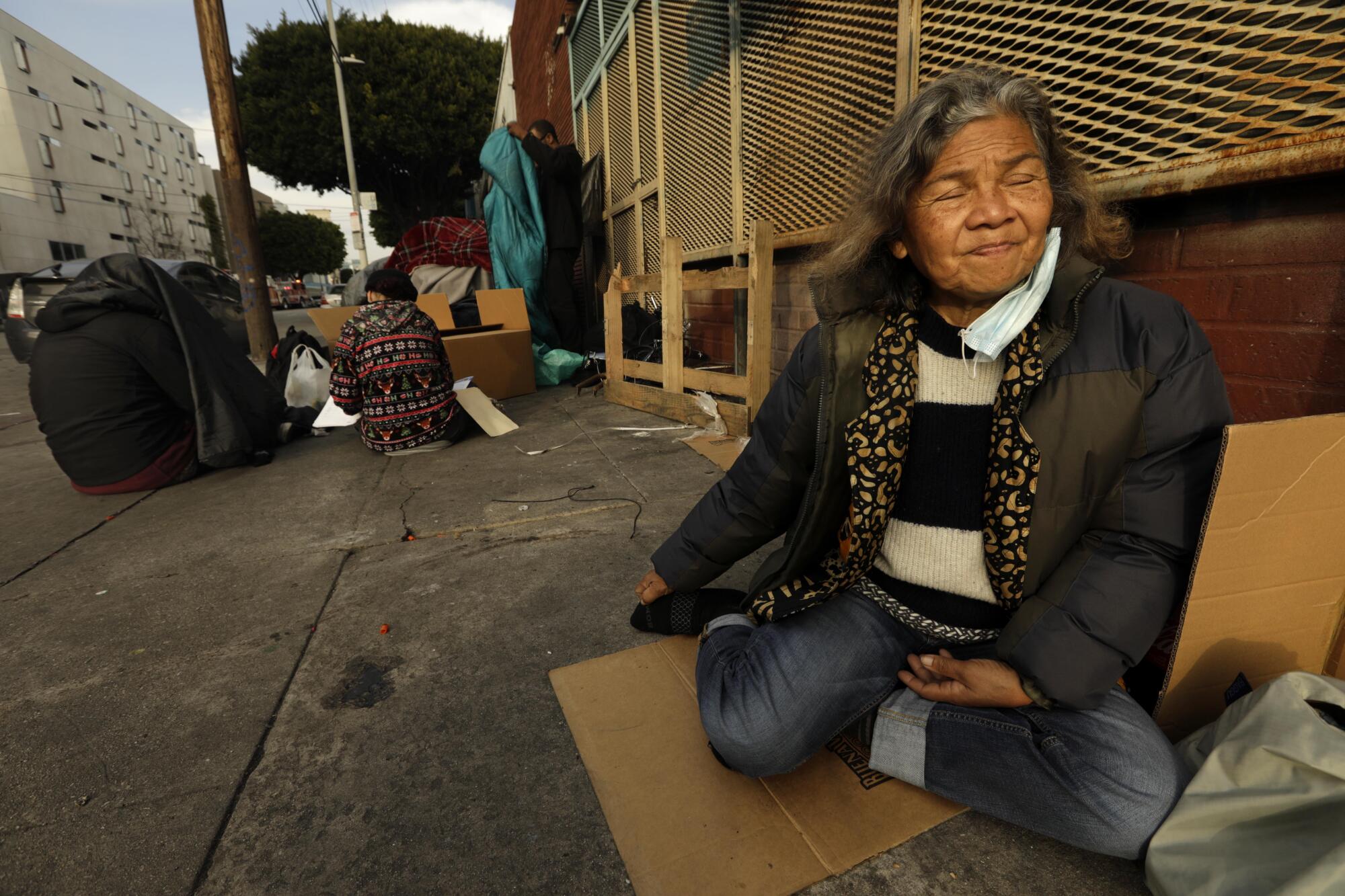
It’s equally hard to imagine that Garcetti would have done what Bass did and call Melina Abdullah, the leader of Black Lives Matter-LA, to alert her to the decision before it went public, and then hold a private meeting with the group days after it held a news conference denouncing the decision.
The LAPD’s outspoken critics on the City Council were silent on Chief Michel Moore’s reappointment.
As a lifelong coalition builder and former community organizer, Bass is a very different kind of leader.
Abdullah praised the mayor’s accessibility, saying “she isn’t running from conversations that she knows are going to be tough conversations.”
“She’s definitely a bridge-builder,” said Stuart Waldman, president of the Valley Industry and Commerce Assn., a prominent business group that endorsed Caruso prior to the election.
Waldman, who praised Bass’ early performance and focus on homelessness, cited her decision to bring a diverse group of business leaders to City Hall for a meeting early in her transition.
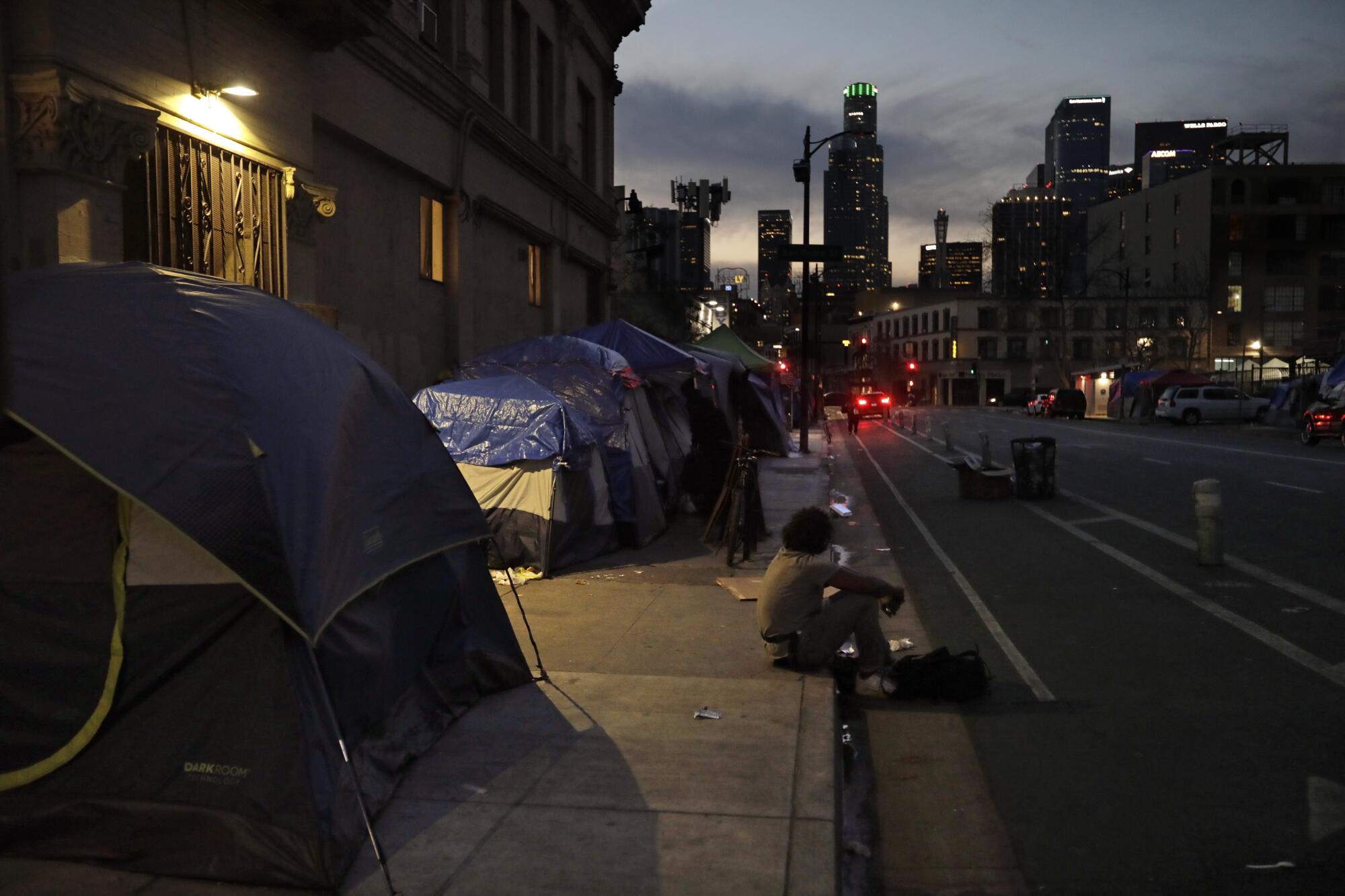
“I figured because we all supported Caruso, we’d be a first-month meeting, not a first-week meeting. I think that says a lot about her,” Waldman said.
The Suffolk University/Los Angeles Times poll, conducted March 9-12, interviewed 500 adult residents of the city of Los Angeles, using live telephone calls to cellphones and landlines. Quota and demographic information — including region, race, and age — were determined from census and American Community Survey data. Surveys were administered in English and Spanish. The margin of sampling error for the total sample is 4.4 percentage points in either direction. Error margins increase for smaller subgroups. All surveys may be subject to other sources of error, including but not limited to coverage error and measurement error.
Watch L.A. Times Today at 7 p.m. on Spectrum News 1 on Channel 1 or live stream on the Spectrum News App. Palos Verdes Peninsula and Orange County viewers can watch on Cox Systems on channel 99.
More to Read
Sign up for Essential California
The most important California stories and recommendations in your inbox every morning.
You may occasionally receive promotional content from the Los Angeles Times.
